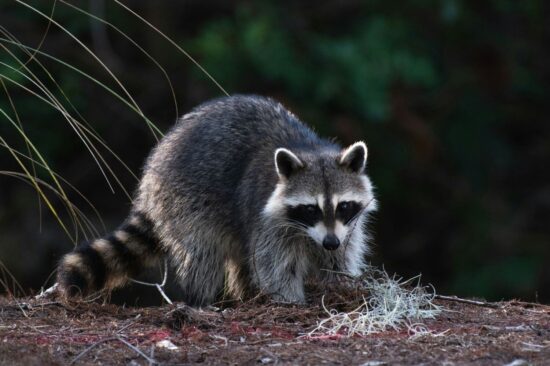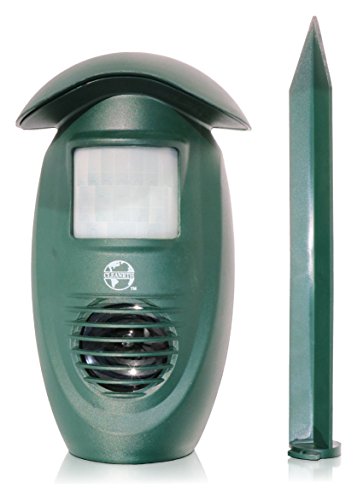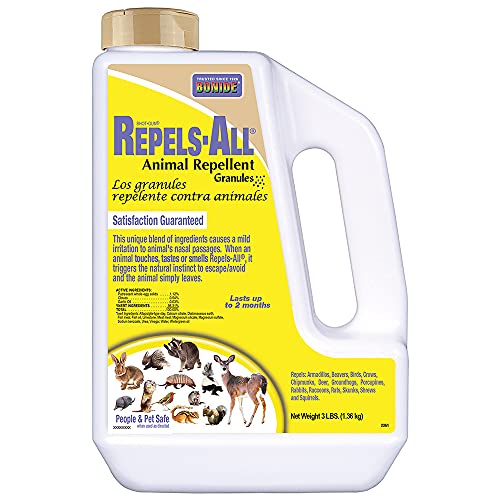Raccoons might look cute with their little masks and tiny hands, but they can turn your yard into a disaster zone overnight. These clever critters love to raid garbage cans, destroy gardens, and even break into chicken coops. If you’ve ever woken up to find your trash scattered across the lawn or your tomatoes mysteriously missing, you know exactly what we’re talking about.
The good news? There are plenty of ways to keep raccoons away from your property. Some methods work better than others, and the best raccoon repellent approach often combines several different techniques. From high-tech sprinklers to simple home remedies, this guide covers some proven methods that actually work.
1. Motion Activated Sprinklers: The Top Choice for Most People
- Made with 100% food-grade castor oil to repel moles and voles
- Safe for pets, kids, and plants — no harsh chemicals
- Treats up to 20,000 sq ft with long-lasting barrier protection
- Rain-resistant and eco-friendly formula breaks down naturally
Motion activated sprinklers are hands down the best raccoon repellent for most situations. These devices combine three things raccoons hate: sudden noise, unexpected movement, and getting sprayed with water. When a raccoon walks into the detection zone, the sprinkler blasts them with water for a few seconds. Most raccoons learn to avoid the area after just a couple of encounters.
Top Products to Look For:
- Orbit 62100 Yard Enforcer Motion-Activated Sprinkler
- Havahart 5277 Critter Ridder Motion-Activated Sprinkler
- Hoont Cobra Solar Motion-Activated Sprinkler
These sprinklers can protect up to 3,800 square feet and run on batteries for 3-6 months. They only use 2-3 cups of water per spray, so they won’t waste water or spike your bill. You can adjust how sensitive they are to catch different sized animals, and many models let you connect multiple units together for bigger areas.
The best part? They work as regular sprinklers too, so you can water your garden during the day and protect it at night. Just mount them about 10-15 inches off the ground (raccoon eye level) and make sure there aren’t any tree branches that raccoons could use to avoid the spray zone.
Why This Works: Raccoons are naturally cautious animals. The sudden burst of water startles them and creates a negative association with your yard.
2. Predator Urine Deterrents: Triggering Fear Responses
- Uses predator scent to trigger instinctual fear in cats, rabbits, and other pests
- Natural, non-toxic granules are safe for pets, people, and gardens
- Time-release formula provides long-lasting outdoor protection
- Easy to shake and apply around flower beds, yards, and property lines
Raccoons have a healthy fear of predators like coyotes and foxes. When they smell predator urine, their instincts tell them to stay away from that territory. This raccoon repellent taps into millions of years of evolution to keep these masked bandits away from your property.
Top Products to Look For:
- Shake-Away Coyote Urine Granules
- American Heritage Industries Red Fox Urine
- PredatorPee Coyote Urine
Coyote urine works best for raccoons since coyotes are their main natural predator. You can buy it in liquid form or convenient granules. The granules are easier to use because you just sprinkle them around the areas you want to protect. Soak cotton balls in liquid urine and place them strategically around garbage cans, garden edges, or under porches.
Apply the urine every 25 feet around the area you want to protect. You’ll need to reapply every 2-3 weeks or after heavy rain because the scent fades over time. Fair warning: this stuff smells pretty strong to humans too, so don’t use it right next to windows or outdoor dining areas.
Why This Works: Raccoons evolved to avoid areas where predators hunt. The scent triggers their survival instincts to find safer territory.
3. Ultrasonic Solar Animal Repellers: High Tech Made Simple
- Triple Scan Technology detects animals up to 66 ft away with 120° arc
- Repels raccoons, deer, rabbits, cats, squirrels, and more — humanely
- Covers up to 7,000 sq ft with powerful ultrasonic and audible deterrents
- Plugs in or runs on batteries, with weather-resistant design for outdoor use
These modern devices use high-pitched sounds and flashing lights to annoy raccoons into leaving your property. Most models are solar powered, so you just stake them in the ground and let them do their work. The sounds are too high for humans to hear, but they’re irritating to many animals.
Top Products to Look For:
- CLEANRTH Advanced Ultrasonic Animal Repeller
- Hoont Solar Powered Motion Activated Ultrasonic Animal Repeller
- Wikomo Ultrasonic Animal Repeller 4-pack
These devices typically cover 3,000-4,000 square feet and include motion sensors that trigger both sound and light when animals get close. Many models let you adjust the frequency to target specific animals. The solar panels keep them running automatically, and most have backup batteries for cloudy days.
Mount them about 10-12 feet high and point them toward the areas where you’ve seen raccoon activity. The combination of ultrasonic sound and flashing LED lights creates an uncomfortable environment that most raccoons prefer to avoid.
Important Note: Results can vary with ultrasonic devices. Some raccoons adapt to the sounds over time, and the devices may bother pets (especially small animals like guinea pigs). However, many people report good success, especially when combined with other methods.
Why This Works: Raccoons prefer quiet, predictable environments. Constant noise and flashing lights make them uncomfortable and likely to move on.
4. Commercial Granular Repellents: Ready to Use Solutions
- Repels over 15 animals including deer, rabbits, squirrels, raccoons, and skunks
- Triggers natural instinct to avoid treated areas through scent and taste
- Safe for pets, people, lawns, and gardens when used as directed
- Biodegradable granules provide up to 2 months of protection per application
If you want something that works right out of the package, commercial granular repellents are a great choice. These products combine multiple raccoon repellent ingredients like predator scents, essential oils, and hot pepper extracts into weatherproof granules that last longer than homemade mixtures.
Top Products to Look For:
- Repels-All Animal Repellent Granules
- Critter Ridder Animal Repellent Granules
- Liquid Fence Granular Animal Repellent
Most commercial repellents use a mix of coyote urine, peppermint oil, and capsaicin (the stuff that makes peppers hot). The granules are designed to release scent slowly over time and resist washing away in rain. One container typically covers 3,000-5,000 square feet.
Apply granules at a rate of about 1 pound per 1,000 square feet around garden perimeters, near garbage cans, or anywhere you’ve seen raccoon damage. Reapply every 30-60 days or after particularly heavy rains. The granules work best when applied in the evening before raccoons become active.
Why This Works: Multiple scent deterrents create an unpleasant sensory experience that raccoons learn to associate with your property.
5. Hardware Cloth and Physical Barriers: The Ultimate Protection
When you absolutely need to keep raccoons out, nothing beats a good physical barrier. Hardware cloth is basically heavy-duty wire mesh with small openings that raccoons can’t squeeze through or tear apart. Unlike chicken wire (which raccoons can easily rip), hardware cloth creates an impenetrable barrier when installed correctly.
Use 1/4 inch to 1/2 inch galvanized hardware cloth for the best protection. The smaller holes keep out everything from raccoons to mice, while the galvanized coating prevents rust. Choose 19-gauge wire or thicker for areas where raccoons might try to push or pull on the barrier.
For chicken coops, cover all windows and vents with hardware cloth secured using screws and washers (never just staples, which raccoons can pull out). Bury the cloth 12 inches deep around the perimeter to stop digging, or create a 12-inch “apron” extending outward from structures.
Why This Works: Physical barriers don’t rely on raccoon behavior or psychology. When properly installed, they make it physically impossible for raccoons to access protected areas.
6. Electric Fence Kits: Maximum Garden Protection
Electric fences deliver a mild but memorable shock that teaches raccoons to stay away. Modern kits are safe for humans and animals but provide enough of a zap to discourage return visits. This method works exceptionally well for protecting gardens, chicken coops, and fish ponds.
Most effective setups use two wires: one about 4-6 inches off the ground and another 6 inches above the first. Solar powered kits work great for remote areas, while plug-in models provide more consistent power. Low-impedance chargers work better when vegetation touches the wires.
Clear all grass and weeds away from the wires so they don’t drain power from the system. Remove any objects near the fence that raccoons could climb to avoid the wires. Many people use timers so the fence only runs at night when raccoons are active.
Safety Note: Modern electric fence chargers are designed to be safe, but always follow manufacturer instructions and local regulations.
Why This Works: Raccoons are smart enough to remember negative experiences. A few encounters with an electric fence teaches them to avoid the entire area.
7. Cayenne Pepper and Hot Sauce Sprays: Irritating Their Sensitive Noses
Raccoons have incredibly sensitive noses, and they absolutely hate spicy smells. Hot pepper sprays work by making areas smell and taste unpleasant without causing permanent harm. This method is cheap, natural, and safe around kids and pets.
Simple DIY Recipe:
- 1 bottle hot sauce or 2 tablespoons cayenne pepper powder
- 1 gallon of water
- 1 teaspoon dish soap (helps the mixture stick to surfaces)
- Optional: chopped jalapeño and onion for extra punch
Mix everything together and spray around garden perimeters, near garbage cans, and anywhere you’ve seen raccoon activity. Apply in the evening when raccoons aren’t around to avoid spraying them directly. Reapply every 3-5 days or after rain washes the mixture away.
Important: Avoid getting this mixture on your skin or in your eyes. Wear gloves when applying and keep pets away until it dries.
Why This Works: Raccoons rely heavily on their sense of smell to find food. Strong spicy scents overwhelm their noses and make areas unpleasant to investigate.
8. Essential Oil Repellents: Natural Aromatic Barriers
- Plant-based peppermint oil formula repels pests naturally
- Safe to use around pets, kids, and indoor living spaces
- Great for garages, attics, baseboards, and outdoor areas
- Fresh mint scent with long-lasting protection
Essential oils provide a more pleasant-smelling alternative to chemical repellents while still being effective against raccoons. Certain scents that humans enjoy are overwhelming and unpleasant to raccoons’ sensitive noses.
Peppermint oil works best for raccoons, followed by eucalyptus and cinnamon oils. Mix 10-15 drops of oil per cup of water in a spray bottle and apply around problem areas. You can also soak cotton balls in undiluted oil and place them strategically around your property.
Treat areas every 10-15 feet around the zones you want to protect. The scent fades quickly, so reapply every 3-7 days or after rain. Essential oil raccoon repellent works especially well when combined with other methods.
Why This Works: Strong aromatic compounds overwhelm raccoons’ sensitive olfactory systems, making treated areas unpleasant to investigate.
9. Bright Lights and Strobing Devices: Disrupting Nighttime Activities
- Flashing red LED mimics a predator’s eyes to scare off nocturnal animals
- Solar-powered and light-sensitive — activates automatically at dusk
- Protects poultry, livestock, gardens, orchards, and campsites
- Weatherproof design lasts 3–4 years with zero maintenance
Raccoons are primarily nocturnal and prefer to operate under cover of darkness. Bright lights and strobing devices make them feel exposed and vulnerable, encouraging them to find darker, safer areas to forage.
Top Products to Look For:
- Nite Guard Solar Predator Control Light 4-Pack
- RIRGI Solar Motion Sensor Light 2-Pack
- Aspectek Predator Eye Night Time Solar Deterrent
Solar powered lights work best because they automatically turn on at dusk when raccoons become active. Motion-activated models conserve battery power and create more startling effects. Red LED lights that look like predator eyes are particularly effective.
Install lights at raccoon eye level (10-15 inches off the ground) and space them every 25 feet around gardens or chicken coops. For chicken coops, use four lights (one on each side) to create complete coverage. Make sure lights face toward areas where raccoons typically approach.
Why This Works: Bright lights make raccoons feel exposed to predators and disrupts their natural nighttime behavior patterns.
10. Ammonia Soaked Rags: Exploiting Their Cleanliness Instincts
Despite making huge messes in garbage cans, raccoons are actually very clean animals. They don’t like areas that smell like urine or waste, which makes ammonia an effective short-term deterrent. The strong smell signals to raccoons that an area might not be safe or clean.
Soak rags or cotton balls in household ammonia and place them in shallow dishes around problem areas. Focus on garbage can areas, garden perimeters, and spaces under porches or decks. The smell will fade after about a week, so replace the rags regularly.
Safety Warning: Ammonia can be harmful to humans and pets in high concentrations. Use only in well-ventilated outdoor areas and keep away from children and animals. Never mix ammonia with other cleaning products.
Why This Works: Raccoons associate strong ammonia smells with waste and contamination, triggering their instinct to avoid potentially unsafe areas.
11. Coffee Grounds: Recycling Your Morning Brew
Used coffee grounds provide a mild raccoon repellent effect while also benefiting your garden soil. The strong smell and slightly acidic nature of coffee grounds can deter raccoons, especially when combined with other methods.
Alternatives if You Don’t Drink Coffee:
- Folgers Classic Roast Ground Coffee – brew it first, then use the grounds
- Ask local coffee shops for their used grounds (usually free)
Spread fresh used coffee grounds around garden perimeters and problem areas. Replace them every 3-4 days as the scent fades and the grounds break down. Coffee grounds work better as part of a combination approach rather than a standalone solution.
Bonus Benefits: Coffee grounds add nitrogen to soil and can help deter other pests like slugs and ants.
Why This Works: The strong aroma and texture of coffee grounds creates a mildly unpleasant sensory experience that raccoons prefer to avoid.
12. Epsom Salt Barriers: Mineral Based Deterrent
Epsom salt creates both taste and smell deterrents while potentially benefiting your garden soil. The mineral content and texture are unpleasant to raccoons while being safe for most plants and beneficial for soil health.
Top Products to Look For:
- Epsoak Epsom Salt 19lb Bag
- Dr Teal’s Pure Epsom Salt 6lb Bag
- SaltWorks Ancient Sea Salt 5lb Bag
Sprinkle Epsom salt around garden perimeters and other areas you want to protect. Use about 1 pound per 1,000 square feet for effective coverage. Apply both inside and outside the areas you’re protecting for better results.
Reapply monthly or after heavy rains wash the salt away. The magnesium in Epsom salt can actually benefit many plants, so this method serves double duty as both deterrent and soil amendment.
Why This Works: The taste and texture of salt crystals are unpleasant to raccoons, while the mineral scent marks territory as treated.
13. Securing Attractants: Prevention Based Approach
The most effective long-term strategy isn’t about repelling raccoons but rather removing reasons for them to visit your property in the first place. This prevention-based approach addresses the root cause of raccoon problems.
Key Areas to Address:
Garbage Management:
- Use tight-fitting lids and bungee cords
- Store cans in garages or sheds when possible
- Consider animal-proof containers with locking mechanisms
Food Sources:
- Bring pet food indoors at night
- Clean up fallen fruit from trees regularly
- Use raccoon-proof bird feeders or bring feeders in at night
- Store animal feed in sealed metal containers
Water Sources:
- Fix leaky outdoor faucets
- Empty standing water when possible
- Cover or fence off fish ponds and water features
Shelter Opportunities:
- Seal gaps under porches and decks
- Install caps on chimneys
- Trim tree branches away from roofs
- Remove brush piles and dense vegetation near buildings
Why This Works: When raccoons can’t find food, water, or shelter on your property, they have no reason to stick around or return.
Combination Strategies That Work Best
The best raccoon repellent approach combines multiple methods for maximum effectiveness. Here are proven combinations that work well together:
For Most Homeowners: Motion-activated sprinklers + secured garbage and pet food + cayenne pepper spray around gardens
For Serious Garden Protection: Electric fencing + predator urine granules + bright lights around perimeter
For Chicken Coop Security: Hardware cloth barriers + motion lights on all four sides + secured food storage
For Budget-Conscious Approaches: Coffee grounds + essential oil sprays + ammonia rags, rotating methods every few weeks








